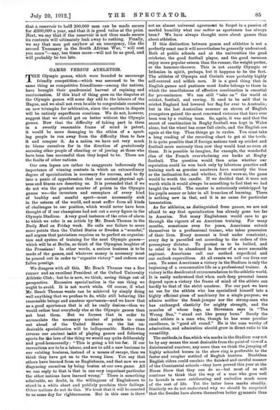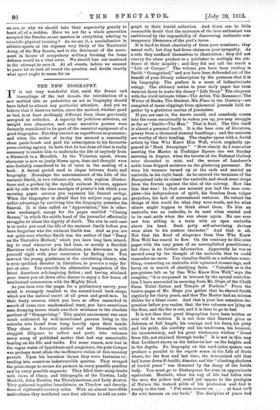GAMES VERSUS ATHLETICS.
THE Olympic games, which were founded to encourage friendly competition—which was assumed to be the same thing as competitive friendliness—among the nations, have brought their quadrennial harvest of repining and recrimination. If this kind of thing goes on the disputes at the Olympic games will some day add to the labours of the Hague, and we shall not even be able to congratulate ourselves on new triumphs for arbitration, since the matters in dispute will be entirely superfluous creations. We do not, however, suggest that we should get on better without the Olympic games. Now that the difficulty of taking part in them in a sweetly reasonable frame of mind is patent, it would be more damaging to the ethics of a sport- ing people to run away from the difficulty than to face it and conquer it. An a nation we have not very much to blame ourselves for in the direction of gratuitously accusing other people of cheating or of jeering at those who have been leas successful than they hoped to be. Those are the faults of other nations.
Our own lapses are rather to exaggerate ludicrously the importance of winning contests in which an extraordinary degree of specialization is necessary for success, and to fly into a panic of apprehension that our ancient physical apt- ness and fitness are deserting us. It is pretended that if we do not win the greatest number of points in the Olympic games we—the inventors and exemplars of every kind of healthy and manful sport—must necessarily sink in the esteem of the world, and must suffer from all kinds of challenges to our position, which would never have been thought of if our champions had not cut a sorry figure in the Olympic Stadium. Avery good instance of the cries of alarm to which we refer is an article by Mr. Beach Thomas in the Daily Mail on Friday week. He calls our failure to score more points than the United States or Sweden a "scandal," and argues that patriotism requires us to perfect an organiza- tion and system of training for the next Olympic games— which will be at Berlin, so think of the Olympian laughter of the Prussians ! In other words, a serious business is to be made of the games, and whatever money is necessary must be poured out in order to "organize victory" and redeem our fallen prestige.
We disagree with all this. Mr. Beach Thomas was a fine runner and an excellent President of the Oxford University Athletic Club ; but he is now, we think, seeing things out of perspective. Excessive speciarzation is the one thing we ought to avoid. It is not worth while. Of course, if what Mr. Beach Thomas wants can be achieved by simply doing well anything that we profess to do, while still behaving like reasonable beings and amateur sportsmen—and we know that as a good sportsman that is all he really desires—then we would rather beat everybody else at the Olympic games than not beat them. But we foresee that in order to accumulate the necessary number of points to come out ahead of the United States on the list un- desirable specialization will be indispensable. Rather than reverse our ancient habit of playing games and following sports for t,he love of the thing we would say quite deliberately and good-humouredly : "This is going a bit too fm.. If our recreations are to be a labour, and are to add a new business to our existing business, instead of a means of escape, then we think they have got on to the wrong lines. You say that others have learned from us Englishmen, and that now we are disgracing ourselves by being beaten at our own game. All we can reply to that is that in one very important particular the other nations have learned wrong." There is something admirable, no doubt, in the willingness of Englishmen to stand in a white sheet and publicly proclaim their failings. Other nations do not do this. We trust that it will be counted to us some day for righteousness. But in this case is there not an almost universal agreement to forget in a passion of morbid humility what our metier as sportsmen has always been ? We have always thought more about games than about athletics.
If this distinction between games and athletics is not a perfectly exact one it will nevertheless be generally understood. Both at public schools and at the universities the good cricketer, the good football player, and the good oarsman enjoy more popular esteem than the runner, the weight-putter, or the hammer-thrower. This is not exactly Olympic or Isthmian in spirit, perhaps, but it happens to be the fact. The athletes of Olympia and Corinth were probably highly self-centred and selfish men. It is a good thing that in English games and pastimes most kudos belongs to those in which the unselfishness of effective combination is essential for pre-eminence. We can still "take on" the world at cricket, football, and rowing. It used to be said that in cricket England had lowered her flag for ever to Australia ; but in the last Australian summer an eleven of English youngsters gained the most renowned victories that have ever been won by a visiting team. So, again, it was said that the secret of combination in Rugby football was kept in Wales alone, but the wheel has come full circle, and the English are again at the top. Thus things go in cycles. You must take a long reading of the recording chart to get at the truth. It is quite possible that if foreign nations took up cricket and football more seriously than now they would beat us even at these. It is possible to imagine, for example, the wonderful élan of the French overwhelming our backs at Rugby football. The question would then arise whether our reputation could be won back only by laborious practice and training such as genuine amateurs have scarcely the time or the inclination for, and whether, if that were so, the game would be worth the candle. If we decided that it were not worth while it would always be something to feel that we had taught the world. The master is notoriously outstripped by his pupils sooner or later in all branches of learning. There is nothing new in that, and it is no cause for particular Lamentation.
As for athletics, as distinguished from games, we are not afraid to say that specialization has already gone too far in America. Not many Englishmen would care to go through the rigours of an American training. For many months, sometimes even for years, Americans submit themselves to a professional trainer, who takes possession of their lives. Every moment is lived under constraint; every day is parcelled out according to the orders of this peremptory dictator. To protest is to be bullied, and to rebel is to be abandoned in favour of a more amenable aspirant. Americans call our method superficial and our outlook supercilious. At all events we call our lives our own. To some Americans a victory in the Stadium is only the beginning of a remunerative life as a professional trainer. A. victory is the desiderated re3ommendation to the athletic world. It is easily understood that when such deep personal issues depend upon a victory the frame of mind of the athlete can hardly be that of the strict amateur. For our part we have no use for the athlete who has specialized himself into a highly efficient piece of machinery for a single purpose; we admire neither the freak-jumper nor the strong-man who has exchanged elasticity for mighty strength, and the muscles of whose legs, as Stevenson says in "The Wrong Box," "stand out like penny buns." Surely the ideal athlete is a man who, though be has some peculiar excellence, is "good all round." He is the man worthy of admiration, and admiration should grow in direct ratio to his versatility.
The methode,in fine,which win marks in the Stadium may not be by any means the most desirable from the point of view of a disinterested amateur, any more than we think the jumping of highly schooled horses in the show ring is preferable to the faster and rougher method of English hunters. Doubtless English riders could emulate the finished and careful manner of the Continental schools —they have proved this year at the Horse Show that they can do so—but most of us will continue to think that the way of a man who goes well to hounds is more exhilarating and embodies much more of the zest of life. Yet the latter loses marks steadily. Similarly we do not understand why we should be surprised that the Swedes have shown themselves better gymnasts than
we are, or why we should take their superiority greatly to heart all of a sudden. Have we not for a whole generation accepted the Swedes as our masters in everything relating to ecientific physical training ? As we see it, a specialization in athletic sports at the expense very likely of the Territorial Army, of the Boy Scouts, and to the detriment of the move- ment in favour of compulsory military training for home defence would be a vital error. We should lose our manhood in the attempt to save it. At all events, before we consent to panic let us look all round the question and decide exactly what sport ought to mean for us.







































 Previous page
Previous page